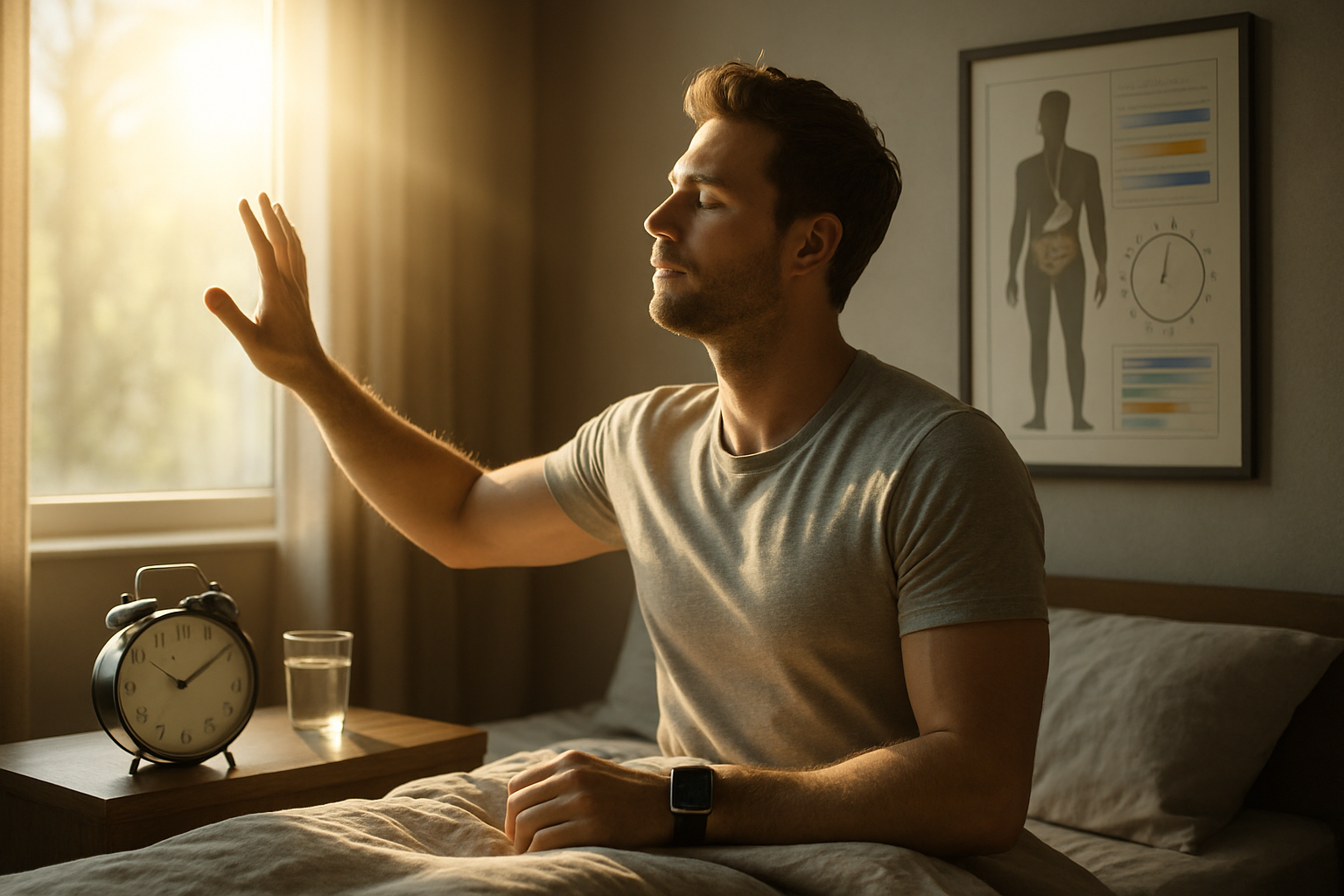Biohacking Your Circadian Rhythm: The Frontier of Personal Health Optimization
Can you imagine a world where you wake up naturally, feel energized all day, and sleep soundly every night? This isn't a far-fetched dream, but a reality that more and more people are achieving through the science of circadian rhythm optimization. As we delve into this fascinating realm of biohacking, we'll explore how aligning your daily habits with your body's internal clock can revolutionize your health, productivity, and overall well-being.

The Science Behind Circadian Rhythms
Our circadian rhythm is primarily influenced by light exposure, particularly blue light. This system evolved over millions of years to align our bodily functions with the natural light-dark cycle of the Earth. When light hits our eyes, it signals to the brain that it’s time to be awake and alert. Conversely, the absence of light triggers the production of melatonin, the sleep hormone.
In prehistoric times, humans rose with the sun and retired at sunset. Today, however, we’re exposed to artificial light long after dark, confusing our internal clocks and disrupting our natural sleep-wake cycles. This misalignment can lead to insomnia, daytime fatigue, mood disorders, and even increase the risk of chronic diseases like obesity and diabetes.
Hacking Your Light Exposure
One of the most effective ways to optimize your circadian rhythm is by managing your light exposure. This doesn’t mean living by candlelight after sunset, but rather being strategic about the type and timing of light you encounter.
Start your day with bright, natural light exposure. This could mean going for a morning walk or simply sitting by a sunny window for breakfast. This early light exposure helps to suppress melatonin production and boost cortisol, promoting wakefulness and setting your circadian clock for the day.
In the evening, gradually reduce your exposure to blue light. Many smartphones and computers now have built-in blue light filters that can be scheduled to activate at sunset. Consider using warm, amber-colored lights in your home during the evening hours. Some biohackers even wear blue-light blocking glasses after sunset to further protect their circadian rhythm.
Timing Your Meals for Circadian Alignment
Emerging research suggests that when we eat can be just as important as what we eat when it comes to our circadian health. Our digestive system, like other bodily functions, operates on a circadian schedule.
Limiting your eating window to daylight hours can help align your digestive processes with your circadian rhythm. This practice, sometimes called time-restricted feeding, has been shown to improve metabolic health, enhance sleep quality, and even potentially extend lifespan in animal studies.
Consider having your last meal of the day at least 3 hours before bedtime. This allows your body to focus on repair and regeneration during sleep, rather than digestion.
Temperature Regulation for Optimal Sleep
Body temperature plays a crucial role in our sleep-wake cycle. Our core temperature naturally drops slightly in the evening, signaling to our body that it’s time to sleep. You can enhance this process by manipulating your environment.
Keep your bedroom cool, ideally between 60-67°F (15-19°C). Some biohackers use cooling mattress pads or wear cooling wristbands to lower their body temperature in the evening. Conversely, taking a warm bath 1-2 hours before bed can paradoxically help you fall asleep faster. As your body cools down after the bath, it mimics the natural temperature drop that occurs before sleep.
Movement and Exercise Timing
Physical activity is another powerful tool for circadian optimization. Exercise can help reset your circadian clock, especially when done at consistent times. Morning exercise, in particular, can help reinforce your wake cycle and improve nighttime sleep quality.
However, the timing of your workouts matters. High-intensity exercise too close to bedtime can be stimulating and interfere with sleep. Aim to complete any vigorous workouts at least 3 hours before bed. If you prefer evening exercise, opt for gentler activities like yoga or stretching.
Circadian Rhythm Hacks for Optimal Health
-
Use a sunrise alarm clock to wake up naturally with gradually increasing light
-
Invest in smart bulbs that automatically shift to warmer tones in the evening
-
Practice earthing or grounding by walking barefoot outdoors to sync with the Earth’s natural rhythms
-
Try a morning cold plunge to boost alertness and reset your circadian clock
-
Use adaptogenic herbs like ashwagandha in the evening to support your body’s natural wind-down process
-
Experiment with different bedtimes to find your optimal sleep window
-
Create a consistent sleep schedule, even on weekends, to reinforce your circadian rhythm
As we continue to unlock the secrets of our internal clocks, the potential for optimizing our health through circadian alignment becomes increasingly clear. By harmonizing our daily habits with our body’s natural rhythms, we can tap into a wellspring of vitality and well-being. Remember, small, consistent changes can lead to profound improvements in your overall health. Start by implementing one or two of these strategies and observe how your energy, mood, and sleep quality improve. The journey to circadian optimization is a personal one, but the rewards of living in sync with your body’s natural rhythms are universal.





